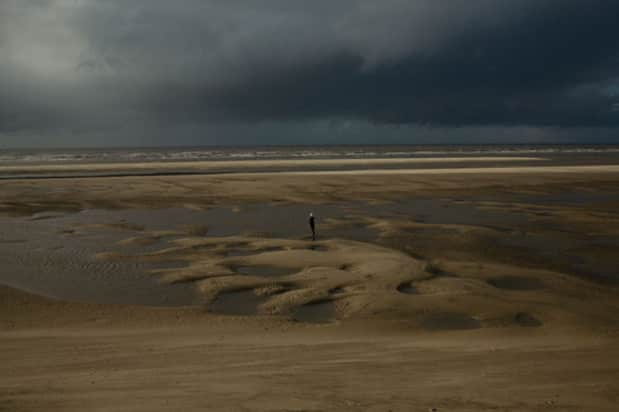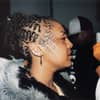The perfect pop analog to Harlem's Charles Hamilton is Blackpool, England's Little Boots aka Victoria Hesketh. Both have blogs where they constantly update fans with new songs (Hesketh's is here) and those songs are consistently the best ones you've heard all day. Both are super young and kind of nerdish, but Little Boots exploded clubs like a hardened studio rat last year with "Stuck On Repeat," which, we promise you, was not an accident. Kim Taylor Bennett caught up with Hesketh and her Tenori-On at her new home in London while photographer Leonie Purchas took her back to Blackpool for some epic coastal scenery. Read the full story after the jump and check back with TheFADER.com for more Little Boots exclusives.
On a wet, blustery day in mid-November, Victoria Hesketh arrives in the chilly city of Brighton, England after an hour-long flight from Hamburg, Germany and a two-hour van ride to the coast. She is here for her show at Coalition, a chrome-interiored club just yards from the squalling sea. Yesterday she played an Urban Outfitters in-store before getting trashed at a warehouse party. Today she’s feeling rumpled from her hangover and the lingering cold she caught in New York that found her getting “totally wired on hardcore American flu drugs.” In spite of all this, Hesketh remains a sparky chatterbox.
Hesketh, who records and performs as Little Boots, natters away backstage while rooting through her exploding suitcase, while lining her blue eyes, while braiding her platinum hair, while sending emails and even while mixing her latest downloadable compilation—meticulously fussing with the tracks until ’80s italo disco tune “Sexy Teacher” by Check Up Twins blends seamlessly into the glacial electronica of Fan Death’s “Veronica’s Veil.” “I have to be productive all the time, always multi-tasking, thinking about tomorrow, the next week,” she explains over a cup of tea, still hours away from her 1AM set time. “My brother’s got ADD really bad. I’m okay because I channel it in my music, but all my family has a mild strain of it. We all talk one hundred miles an hour. Back home everyone is bouncing off the walls. It’s like a bus station!”
Tonight she’s feeling particularly antsy because her first ever performance on Later… With Jools Holland will soon be televised. The show has long been a milestone for British musicians, and on this episode she reworked her slinky synth single “Meddle” amidst the lineup of Al Green, Damon Albarn, Fleet Foxes and The Killers. For this rendition she stripped her song of its dancefloor gloss, reducing the accompaniment to her piano, her Stylophone and her trademark Tenori-On?a Japanese sequencer that visually represents beats and samples in LED lights. “It was one of the scariest experiences of my life!” she says, although she seems deliriously excited about meeting Killers front man Brandon Flowers. “I was such a fan girl,” she says, her voice ratcheting up an octave. “I kept trying to crack jokes. So embarrassing!” Afterwards she met up with her mom and dad, who traveled to London for the taping from her native Blackpool—England’s resort town of yesteryear. “I think it was the moment my dad understood that this is not just some teenage dream that’s been going on for a bit too long,” says the twenty-four-year-old.

“Meddle” was produced by Joe Goddard of Hot Chip, who says he was inspired by Britney Spears' “Toxic”. But it’s really “Stuck on Repeat,” another Goddard-assisted track, that’s caused the overly-eager to tag her with the shuddersome title “The Future of British Pop.” With entranced lyrics that echo the song’s hypnotic pulse, everything from the sleigh bell jingle to the Moroder synth-throbs create a dynamic synergy in “Stuck on Repeat” that pop royalty blows million-dollar budgets looking for. Hesketh originally penned the song with Kylie Minogue in mind. It was recorded in Goddard’s cramped bedroom.
Hesketh caught the attention of Later’s producers after a video of her performing “Meddle” in her bedroom was featured on YouTube’s frontpage. It is her personal channel on the video-sharing website that has mostly defined her public perception so far. On it she performs alternate versions of her own songs and “Funtime Covers” where she reinterprets chart toppers. Often dressed down in a T-shirt or her pajamas, Hesketh gives Estelle’s “American Boy” a piano virtuoso flair, trades robotosized tween angst for soul on Miley Cyrus’ “See You Again” and turns hands-in-the-air house anthem “Bullet in the Gun” by Planet Perfecto into “Bullet in the Fun” by beginning it as a sultry dive bar ballad before she sets her Tenori-On to make-your-own rave. “[The videos] really connect with people because I’m just genuinely in my bedroom dicking around,” Hesketh says. “I’m a real person in a dodgy bedroom in East London, playing piano and singing into a webcam.”
Hesketh started doing the covers as a sanity-preserving exercise as she tried to write her own music, but found that deconstructing the hits was an unexpectedly useful tool. “When you have big, shiny pop music, people just think it’s come out of a machine,” she says. “I want people to see the process.” As her friend Dev Hynes, who records as Lightspeed Champion, adds, “She’s the only other person who is as obsessed as I am with structures and forms in pop music. She’ll dissect songs with me for hours.”
As Little Boots, Hesketh gives her penchant for pop free reign. She calls herself “a cheese machine,” but as Jas Shaw of Simian Mobile Disco, who produced her track “Ghost,” notes, she balances her populist side with savvy collaborative choices that lead to innovative results. “She’s really up for trying stuff out and that’s reflected in the people she’s worked with, people with a more leftfield aesthetic, like Joe Goddard and Joe Mount of Metronomy,” he says. “Usually when you get people in the studio you’re desperately searching for hooks, with her there’s a barrage of them.”
Back in the late ’90s when Britpop was on the wane, the UK charts were congested with marionette stars: Americans like Britney, Christina and The Backstreet Boys, plus countless locally-created acts like The Spice Girls, boybanders Boyzone and Westlife, and high camp ABBA wannabes Steps. Pop was synonymous with artifice and svengalis, devoid of the elusive authenticity that “serious” music fans are obsessed with. But in recent years the balance has shifted as bands like The Kaiser Chiefs and Franz Ferdinand infiltrated the Top 10 along with popstrels like Lily Allen and Kate Nash, whose independence is integral to their personas. As music continues to get hyper-categorized into increasingly specific genre descriptions, more musicians just want their work to exist under the broad umbrella of pop. Or, as Little Boots’ recent tourmate thecocknbullkid puts it, “Pop equals freedom.” There are no guilty pleasures anymore. Instead there are forthright females like thecocknbullkid, Marina and The Diamonds, La Roux, Florence and The Machine, Micachu and, of course, Little Boots, who are expanding the parameters of pop by taking control of their own music. “It’s about time there’s a female popstar that’s into technology. There are lots of girls with synths—Le Tigre, Chicks on Speed—but I think it’s cool that Victoria wants to be a popstar without being dressed up and told what to do,” says Goddard. “With Little Boots and Hot Chip we try to make pop that’s not sterile: music with a bit of life, intelligence and sexiness to it.” All of those qualities are found in her layered, glitch-dripped “New in Town,” a strutting tale of partying with strangers, and the Goddard-produced “Mathematics,” where in a lilting vocal over whip-cracked beats, Hesketh tackles the complexity of relationships using the language of equations as a metaphor. Inspired by Sylvia Plath’s “Love Is A Parallax” (“What girl didn’t go through the teenage Plath phase!” she says), it’s far beyond the usual three minutes of purred, ambiguously worded come-ons.

Though most aspiring pop kittens look to emulate starlets of the past, Little Boots reveres the craft and songwriting ability of Cathy Dennis. A solo artist in the early ’90s, Dennis went on to co-write Minogue’s "Can't Get You Out Of My Head," Spears’ “Toxic” and Katy Perry’s ubiquitous “I Kissed A Girl.” “Co-writing has become a bit of a dirty word, because people think that when pop people co-write they go in, cough and get a songwriting credit,” says Hesketh. “But I think the collaborative process is really inspiring.”
While Hesketh is very much the captain of her own sonic space shuttle, a significant chunk of Little Boots’ as-yet-unfinished debut album was written with Greg Kurstin, an LA musician who has worked with Peaches, Beck, Lily Allen, Jenny Lewis and Britney Spears, variously as a songwriter, producer and a multi-instrumentalist. Kurstin met Hesketh while she was still fronting kohl-eyed, indie synth trio Dead Disco. The band formed just before Hesketh turned twenty-one, after she answered an ad on a music website when she was at university in Leeds. They released three singles, but by the time they decamped to Los Angeles in 2007 for writing sessions, relations were fractitious. Hesketh is understandably not keen to dwell on what went wrong. She allows that three-way songwriting was “a tricky dynamic” and they were moving in a more rock-orientated direction, which found her fighting her pop instincts. “Plus, I was a bit of headache. I was the one who always wanted to stay out all night and party and I’d turn up at a photoshoot in the morning off my face,” she says, before turning serious. “[Dead Disco] was everything for two years, so it was really hard to leave. At the time I couldn’t tell if I was making the best or worst decision of my life.”
She credits Kurstin for bolstering her confidence when it faltered. “I can relate to her insecurity. It’s hard when you’re in a bubble working on your own, you need someone to say, I really like what you did there,” he says. “I think songwriting is not exactly a science, but a little bit of a craft, and she has a natural ability with that craft.”
Hesketh’s home sits down a quiet and uneven cobbled street, a two-minute stroll from fashionable Shoreditch. It was the first house in London she looked at, and she snapped it up as soon as she saw the upright piano in the living room. Upstairs is the bedroom glimpsed in her YouTube videos. In her polka dot slippers she apologizes for the unmade bed, then clears a space for me in the rocking chair where she writes most of her lyrics.
Looking through a photo album, Hesketh calls out each fashion faux pas with glee, “Furry coat! Baggy denim! Pink flowery tie with a red top! Really big look! I had the worst style ever.” A self-described childhood dweeb, Hesketh demanded piano lessons at four and was reading sheet music by five. She says it wasn’t until she was sixteen and she moved schools for the fifth time that she became more social, playing in a pop punk cover band, becoming a goth, becoming a hippie, going grunge, singing jazz, selling her harp for a Korg and getting into prog. “All in about six months, of course,” she says.
Then she comes upon a photo from her second year at university when she dyed her hair inky black, instantly upping her cool quotient. “It was around this point that I got a boyfriend I really liked, got into indie,” she explains. Then there are chaotic, close-up live shots of UK rock group The Cribs. “That New Year’s Eve,” she says. “I saw The Cribs and The Kaiser Chiefs play a tiny pub in Leeds. It was definitely a turning point. I was like, Wow! I want to be in band!’”

Later that night at Smash & Grab, an indie dance night at Punk in Soho, Hesketh has been asked to spin “a wedding set,” a departure from her usual selection of “electro bangers,” remixes and obscure italo disco. In a sequined skirt and tiny killer heels, Hesketh drinks vodka cranberries and races through a set of ’90s nostalgia hits: Ace of Base, Garbage, Destiny’s Child, Luniz’s “I Got Five on It” and Ibizan anthem “Dreamer.” Five years ago these songs would have sent the crowd scuttling to the shadows, waiting for something more angular to come on, but tonight a grinning Hesketh keeps the dancefloor filled as she cues up TLC’s “Waterfalls.” Hesketh would argue that it’s not because pop has become cool again, it’s simply a testament to the craft that went into making this music. “In a way the strength of someone’s songwriting is judged on the success of the song,” she says. “Of course there are exceptions, but if a song is great, it will connect with people across the board. It’s not really about world domination or money, it’s about being good at what you do.”


